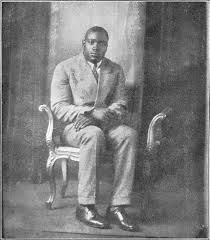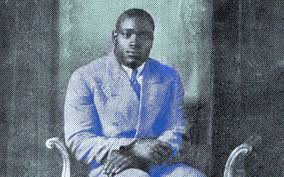Alger Texas Alexander – A Complete Biography
Introduction
Alger “Texas” Alexander (September 12, 1900 – April 1954) was an American blues singer who left a lasting mark on early Texas and country blues. Although he never played an instrument himself, his powerful voice and improvisational singing style made him a distinctive figure in the blues tradition. His recordings in the late 1920s and early 1930s reflected a raw, emotionally charged sound that set him apart from his contemporaries. He worked with many prominent musicians of the era and became known for a unique delivery rooted in the oral traditions of Southern Black communities.

Childhood
Born on September 12, 1900, in Jewett, Texas, Alger Alexander grew up in the Brazos River bottomlands. He spent his early years working as a section hand for the railroad and as a farm laborer. His upbringing in rural Texas immersed him in the rich oral and musical culture of the region, including field hollers, spirituals, and work songs. These early influences would deeply shape his singing style and lyrical content throughout his life.
Youth
As a young man in the early 1920s, Alexander began performing at local gatherings, picnics, and parties. His deep, expressive voice attracted attention, and he gained a regional reputation despite not playing an instrument. He was known to travel throughout Texas, often hopping freight trains to reach performance opportunities. He sometimes carried a guitar with him—not to play it, but to draw other musicians who could accompany his voice. During this period, he established connections with other emerging blues artists and began developing his unique rhythmic and lyrical style.
Adulthood
Alexander’s professional recording career began in 1927. Over the next several years, he recorded more than 60 tracks for major labels such as Okeh and Vocalion. His vocal style was fluid and unpredictable, often departing from standard blues structures, which posed challenges for his accompanists. Nevertheless, he collaborated with some of the most respected musicians of the time, including prominent guitarists, pianists, and string bands.
During the 1930s, Alexander continued to tour with various blues artists and maintained a strong regional presence. Though his fame never reached national levels, he remained a key figure in the Texas blues scene. His lyrics often dealt with hardship, incarceration, work camps, and relationships, drawing from both personal experience and the broader struggles of Black life in the South.
Major Compositions
Alexander’s songs were rich with narrative and emotional depth. Titles such as “Levee Camp Moan Blues,” “Section Gang Blues,” “Penitentiary Blues,” and “Bell Cow Blues” showcased his ability to tell vivid stories through music. His 1934 session with a prominent string band yielded “Frost Texas Tornado Blues,” a song that recounted the devastation of a real-life natural disaster.
One of his most controversial compositions, “Boar Hog Blues,” featured explicit lyrics that led to censorship and legal complications. His work often blurred the line between personal confession and social commentary, and he had a talent for improvising lyrics to reflect current events or audience responses. Despite the lack of instrumental contributions from Alexander himself, his songs were rhythmically inventive and lyrically potent, resonating deeply with working-class Black audiences.
Death
In the late 1930s, Alexander’s life took a dark turn when he was reportedly involved in a violent altercation that led to imprisonment. Though the exact details of the incident remain unclear, it is widely believed that he served time during the early 1940s. After his release around 1945, he resumed performing and made his final recording session in 1950.
In his later years, Alexander suffered from declining health, including complications from syphilis. He returned to live with his grandmother in Richards, Texas, and faded from public view. On a quiet day in April 1954, Alger “Texas” Alexander passed away at the age of 53. He was buried in an unmarked grave in Longstreet Cemetery, in Montgomery County, Texas.
Conclusion
Alger “Texas” Alexander’s life and music reflect the deep roots of the Texas blues tradition. Though he never played an instrument and lived much of his life in obscurity, his voice carried the weight of an entire cultural experience—one shaped by labor, loss, resilience, and storytelling. His influence can be heard in later generations of blues musicians, and his recordings continue to offer a window into the soul of early 20th-century Black life in rural America. Despite the mystery and myth that surround his biography, his legacy endures through the timeless power of his voice and his songs.

Comments are closed